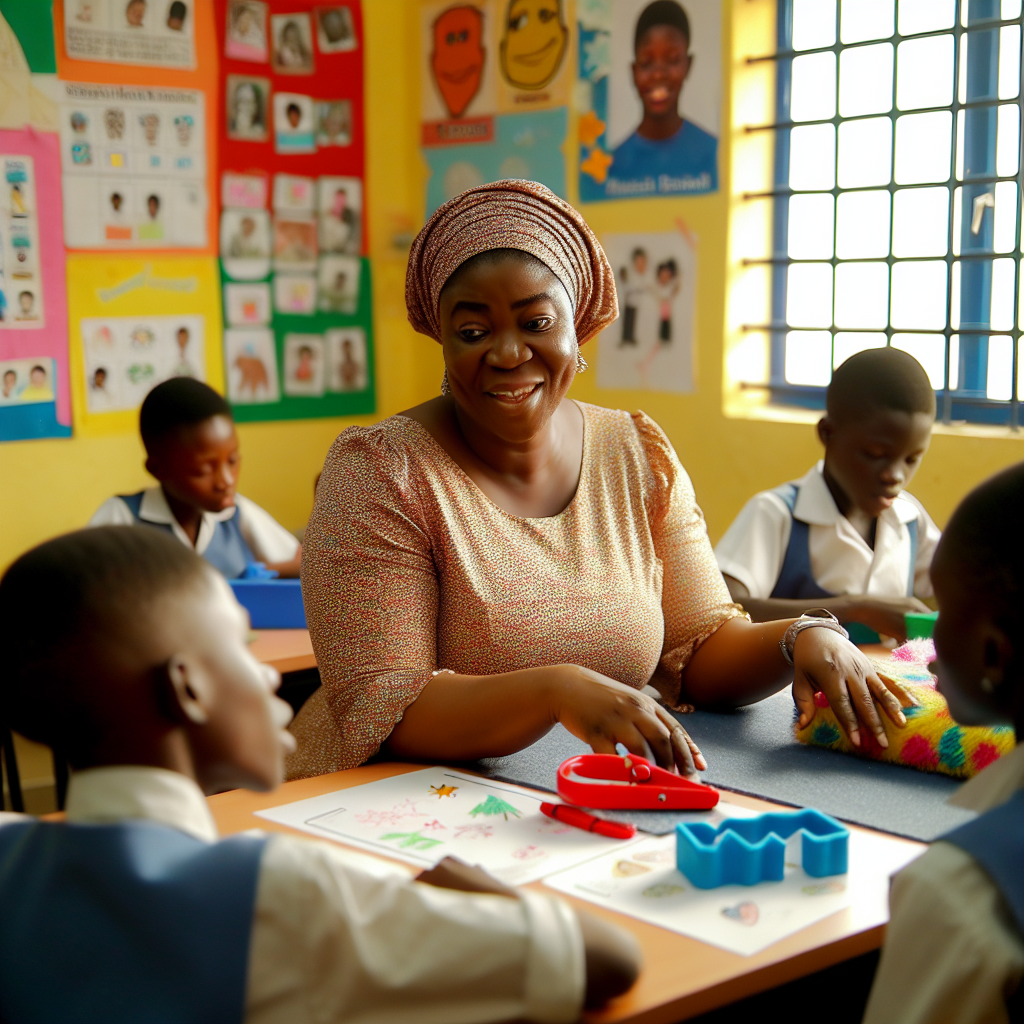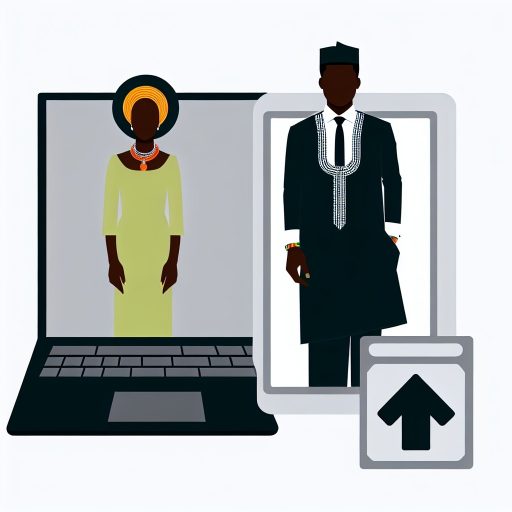An Overview of Special Education in Nigeria
Historical Context
Special education in Nigeria has evolved significantly over the years.
Initially, society largely ignored the needs of children with disabilities.
However, advocacy for inclusive education began gaining momentum in the late 20th century.
In the 1990s, the government recognized special education’s importance.
This recognition led to the establishment of specialized schools and programs.
Despite these advancements, challenges remain in implementation and access.
Current Status
Today, Nigeria has made strides in special education inclusion.
Many states now have special classrooms within regular schools.
Resources, however, still vary significantly across regions.
Urban areas often possess better facilities compared to rural areas.
Despite this, committed teachers work tirelessly to improve children’s lives.
They often go beyond academics, focusing on holistic development.
Challenges and Opportunities
Several obstacles inhibit the effectiveness of special education in Nigeria.
- Insufficient funding hampers the development of necessary resources.
- Lack of trained educators limits the quality of special education.
- Societal stigma persists, affecting students’ self-esteem.
Nevertheless, there are numerous opportunities for growth.
Increasing awareness campaigns can combat stigma.
Partnerships with NGOs can enhance training for teachers.
Ultimately, the commitment of special education teachers plays a pivotal role.
The Role of Special Education Teachers in Promoting Inclusive Education
Understanding Inclusive Education
Inclusive education ensures all students learn together, regardless of their abilities.
It values diversity and promotes interaction among students.
Special education teachers play a crucial role in this process.
Supporting Diverse Learners
Special education teachers adapt teaching methods for various learning needs.
They create tailored lesson plans that accommodate individual abilities.
This personalized approach helps all students thrive in the classroom.
Collaborating with Other Educators
Special education teachers work closely with general education teachers.
This collaboration enhances the overall learning experience for everyone.
By sharing insights and strategies, they improve classroom inclusion.
Training and Empowering Families
Special education teachers provide training for parents and caregivers.
This knowledge empowers families to support their children’s learning.
Moreover, they encourage family involvement in the educational process.
Creating an Inclusive School Culture
Special education teachers advocate for inclusive practices throughout the school.
Their efforts help foster a positive environment for all students.
Additionally, they raise awareness about the importance of diversity.
Continuously Improving Professional Skills
Special education teachers engage in ongoing professional development.
This commitment helps them stay updated on best practices and new research.
They strive to implement effective teaching strategies in their classrooms.
Measuring Student Progress
Special education teachers assess the progress of their students regularly.
This assessment allows them to adjust their teaching methods accordingly.
Through careful evaluation, they identify areas for improvement.
Strategies Employed by Special Education Teachers to Support Diverse Learners
Individualized Learning Plans
Special education teachers develop individualized learning plans for each student.
These plans cater to the specific needs of diverse learners.
Teachers assess students’ strengths and weaknesses regularly.
Subsequently, they adapt their teaching methods accordingly.
Collaborative Teaching Approaches
Collaboration is essential in special education.
Teachers work alongside general education teachers to create inclusive classrooms.
They share resources and teaching strategies to benefit all students.
Such partnerships foster a supportive learning environment.
Utilizing Assistive Technology
Technology plays a significant role in special education.
Teachers implement assistive tools to enhance learning experiences.
Devices like speech-to-text software aid students with communication difficulties.
Moreover, visual aids support comprehension for various learning styles.
Building Strong Relationships
Effective communication with students is vital for success.
Teachers build trust and rapport with their students.
This connection encourages students to engage and express their needs.
Additionally, strong relationships with families reinforce support outside the classroom.
Implementing Flexible Teaching Methods
Flexibility is crucial in addressing diverse learning needs.
Teachers adjust their lesson plans to accommodate different learning paces.
Hands-on activities and group work foster active participation.
Visual and auditory aids further enhance understanding and retention.
Continuous Professional Development
Special education teachers commit to lifelong learning.
They attend workshops and training sessions regularly.
This professional development enhances their skills and knowledge.
Ultimately, it helps them implement the best strategies for their students.
Gain More Insights: Why Becoming a Secondary School Principal is a Top Career Choice in Nigeria
Challenges Faced by Special Education Teachers in Nigeria
Lack of Resources
Special education teachers in Nigeria face significant resource shortages.
Many schools lack essential teaching materials and assistive technologies.
Consequently, educators struggle to provide effective support to their students.
Inadequate Training
Most teachers do not receive adequate training in special education.
This lack of training hampers their ability to meet diverse student needs.
Additionally, continual professional development opportunities are limited.
Societal Stigma
Societal attitudes towards disabilities further complicate their work.
Many communities still harbor negative perceptions of special needs education.
As a result, teachers often deal with discrimination and lack of support.
Heavy Workload
Special education teachers often face heavy workloads.
They frequently manage large classes with diverse needs and abilities.
This increased responsibility can lead to burnout and stress.
Insufficient Funding
Funding for special education programs in Nigeria is often inadequate.
School budgets rarely prioritize special education initiatives.
This lack of financial support limits program development and sustainability.
Impact on Service Delivery
Reduced Learning Outcomes
Challenges significantly affect students’ learning outcomes.
Students with special needs may not receive the help they need to succeed.
Consequently, many struggle academically and developmentally.
Teacher Motivation
These challenges often impact teacher motivation and morale.
Teachers may feel overwhelmed and unsupported in their roles.
As a result, turnover rates can be high among special education staff.
Quality of Education
Overall, the quality of special education suffers in Nigeria.
Teachers find it difficult to implement effective individualized education plans.
This situation decreases the overall effectiveness of special education programs.
Publish Your Professional Profile, Business or Brand
Showcase your expertise, gain trust, and boost visibility instantly on Professions.ng.
Publish NowAwareness and Advocacy
Awareness of the challenges faced is crucial for advocacy efforts.
Increasing public knowledge can generate support for better policies.
Advocacy can lead to improved training and funding for special education.
See Related Content: Why Early Childhood Education is a Growing Career in Nigeria
Case Studies of Successful Special Education Programs
Innovative Learning Centers in Lagos
The Learning Empowerment Center in Lagos provides tailored programs for children with disabilities.
These programs focus on individualized instruction to meet each child’s unique needs.
As a result, students show remarkable improvements in academic and social skills.
Community-Based Support in Enugu
In Enugu, the Community Special Education Initiative collaborates with local schools.
They offer workshops for special education teachers to enhance their skills.
This program has increased teacher confidence and effectiveness in the classroom.
Partnerships with Non-Governmental Organizations
NGOs play a crucial role in expanding resources for special education in Nigeria.
For instance, the Reach Out Foundation has pioneered inclusive education programs.
These initiatives enable children with disabilities to thrive in mainstream schools.
Parent Engagement Strategies
Successful programs also prioritize parent involvement through workshops and support groups.
These initiatives help parents understand how to support their children’s education.
Active parent participation leads to better educational outcomes for students.
Impact Assessment and Evaluation
Monitoring and evaluation are critical components of successful special education programs.
Regular assessments help identify areas for improvement and measure progress.
Through these evaluations, programs can adapt to better serve children’s needs.
Uncover the Details: Why Becoming a Special Education Teacher is One of the Most Rewarding Professions in Nigeria

Collaborative Efforts for Student Success
Building Strong Partnerships
Special education teachers actively seek partnerships with parents.
This collaboration fosters better communication regarding students’ needs.
Moreover, it creates a supportive network for students.
Teachers and parents can share valuable insights about the child.
Consequently, both parties can work towards common educational goals.
Sharing Responsibility
Parents play a crucial role in their child’s education journey.
Teachers encourage parents to engage in school activities.
This involvement strengthens the connection between home and school.
Both parties can monitor progress and adapt strategies accordingly.
As a result, students receive consistent support in their learning.
Effective Communication Strategies
Regular meetings allow teachers and parents to discuss progress.
These discussions provide opportunities for feedback and suggestions.
Teachers offer guidance on how parents can reinforce learning at home.
Additionally, they share resources to support students effectively.
Consequently, families feel more empowered to assist their children.
Celebrating Achievements Together
Acknowledging student progress is vital for motivation.
Teachers celebrate achievements during school events.
Parents are encouraged to join in these celebrations.
This shared recognition boosts students’ confidence and self-esteem.
In turn, it fosters a community focused on student success.
Continuing Education for Parents
Workshops empower parents with knowledge about special education.
These sessions cover effective teaching strategies and resources.
Teachers facilitate these workshops to strengthen parent-teacher partnerships.
As a result, parents become advocates for their children’s education.
Ultimately, informed parents can make better decisions for their children.
Explore Further: Best Teaching and Educational Jobs in Nigeria for 2024
The Influence of Government Policies on Special Education Teaching Practices in Nigeria
Overview of Government Policies
The Nigerian government has established policies to support special education.
These policies aim to ensure equal rights for individuals with disabilities.
Additionally, the government promotes inclusivity in educational institutions.
Impact on Teacher Training
Government policies significantly influence the training of special education teachers.
They establish standards that teacher training programs must meet.
This ensures teachers receive adequate preparation for diverse learning needs.
Moreover, ongoing professional development is emphasized for teachers.
Funding and Resource Allocation
Funding for special education remains a critical concern in Nigeria.
Government policies dictate resource allocation for special education programs.
Unfortunately, insufficient funding often hinders effective teaching practices.
Conversely, increased investment can enhance educational opportunities.
Integration into Mainstream Education
Policies encourage the integration of special education within mainstream schools.
Such efforts promote social interaction and understanding among students.
Teachers play a key role in creating an inclusive classroom environment.
However, training and resources must support this integration effectively.
Collaboration with Non-Governmental Organizations
Collaboration between the government and NGOs enhances special education services.
NGOs often provide additional training and resources for teachers.
These partnerships can lead to successful implementation of educational programs.
Ultimately, sharing expertise supports both teachers and students.
Challenges and Opportunities
Despite progress, challenges remain in implementing government policies.
Teachers often face barriers like large class sizes and lack of resources.
However, these challenges also present opportunities for innovative solutions.
Advocating for policy reform can lead to improved teaching conditions.
Future Prospects for Special Education
Embracing Inclusive Education
Special education in Nigeria is evolving rapidly.
Embracing inclusive education benefits students with diverse needs.
This approach fosters social integration and mutual respect.
Teachers are receiving more support and training in inclusive methods.
Enhanced Teacher Training Programs
Training programs for special education continue to improve.
Institutions are implementing new curricula focused on disabilities.
These programs emphasize practical skills and classroom management.
As a result, teachers are better equipped to meet students’ needs.
Collaboration with Multi-Disciplinary Teams
Collaboration with healthcare professionals is becoming common.
Teachers work alongside psychologists, therapists, and social workers.
This teamwork enhances the educational experience for students.
Such partnerships ensure comprehensive support for each child.
Use of Technology in Special Education
Technology is transforming special education practices.
Assistive devices help students engage more effectively.
Online resources provide added learning opportunities.
Teachers are integrating technology into their lesson plans.
Policy and Government Support
The Nigerian government is increasing its focus on special education.
New policies aim to support inclusive educational environments.
Publish Your Professional Profile, Business or Brand
Showcase your expertise, gain trust, and boost visibility instantly on Professions.ng.
Publish NowFunding initiatives are encouraging the development of resources.
Such support fosters a more equitable education landscape.
Emerging Trends in Teacher Training and Development
Professional Development Workshops
Teachers are encouraged to attend professional development workshops.
These workshops focus on the latest educational strategies.
Furthermore, they promote networking among educators.
Sharing best practices enhances the quality of education.
Mentorship Programs
Mentorship programs are gaining popularity in teacher training.
Experienced educators guide new teachers through their careers.
This support helps build confidence and competence.
Ultimately, it improves the overall teaching practices.
Focus on Cultural Competency
Cultural competency training is essential for educators.
Understanding cultural differences enhances student connections.
Teachers learn to adapt their approaches for diverse backgrounds.
This adaptation promotes a more inclusive classroom environment.
Additional Resources
Master of Arts in Special Education – Counseling, Educational …
Nigerian Diaspora Contributes to Special Needs Education | IOM …




